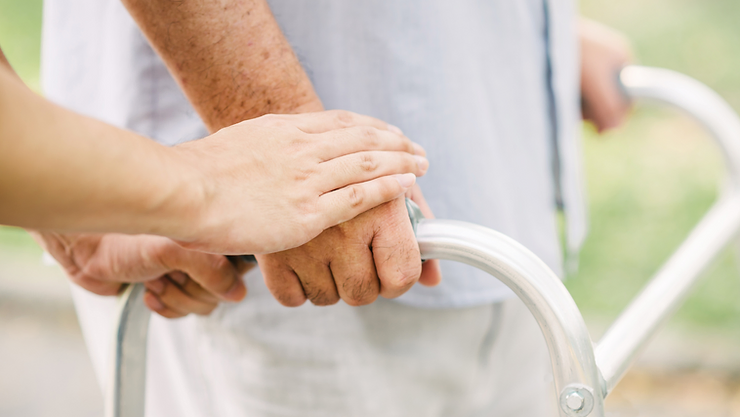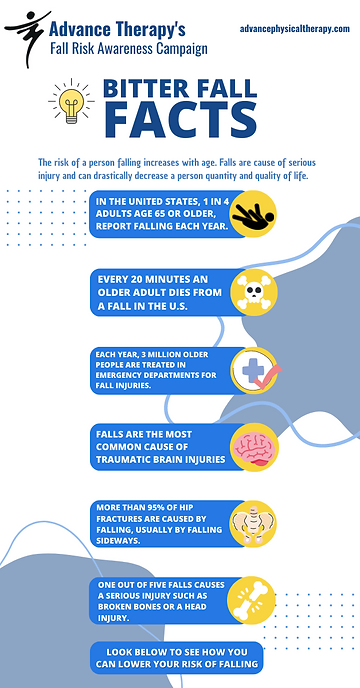54B, Tailstoi Town 5238 MT,
La city, IA 522364
Welcome to Advance Physical Therapy!
Welcome to Advance Physical Therapy!

Advance Therapy is actively campaigning to educate seniors of Fall Risk and what they can do to minimize their risk of suffering a fall.
Why do Seniors Fall?
According to the CDC around 800,000 seniors are hospitalized annually due to fall-related injuries. Falls can affect a person’s quality and quantity of life as well as increase the probability for more falls. Studies show that after a senior falls the first time, their risk of falling again doubles.
There are a variety of internal and external factors in a seniors life that may increase the risk of falling. These risks develop with age since after the age of 65 skeletal muscle strength and mass decline causing muscle weakness and poor balance.
What are external factors in a seniors environment that can increase risk of falls?
What are internal factors that can cause a senior to fall?

7 Tips to Minimize Your Risk of Falling:
1.Exercising and Keeping Your Muscles Strong
The CDC recommends seniors get at least 150 minutes a week of moderate intensity activity like brisk walking, water aerobics, gardening, dancing or tennis.
2. Check Your Diet.
According to the National health Service, there are four groups that should be present in every meal:
1.Lean protein (lean meats, seafood, eggs, beans
2.Fruits and vegetables (think orange, red, green, and purple)
3.Whole grains (brown rice, whole wheat pasta)
4.Low-fat dairy (milk and its alternatives)
3. Keep Track of Your Medications.
It is important to have a system set in place to help keep track of medication intake, especially if you have multiple prescriptions. Incorporating your intake of medication to your morning and evening routine is one of the easiest ways to keep up with your consumption of medications.
4. Get Enough Rest.
The National Institute of Health recommends seniors get 7 to 9 hours of sleep a night.
To do this it is recommended to avoid drinking caffeine and taking naps in the afternoon as these elements could affect your sleeping schedule. Using cellular devices before bed is also not recommended as the blue light emitted from phones and TV’s can affect the production of melatonin.
5. Slow Down and Use Help
Railings in showers and stairs are tools that help seniors keep balance around the house. Installing these at arms reach can be very helpful to sturdiness in a senior’s routine. Walkers and canes also help when moving around from place to place.
6. Conduct a Safety Assessment of Your Home
Clutter in the home can become hazardous for seniors. Make sure that all walkways and busy areas of the house are clear of any items that can potentially cause a fall like loose rugs, boxes or misplaced items.
7. Be Aware of the Side Effects of The Medicine You Take
Keep track of what medications you are consuming and consider giving a trusted loved one a copy in case of an emergency. Read carefully the possible side effects of your medication and if any doubts arise quickly contact your health care provider.
Below we have attached a graphic with facts about falls in the U.S that affect the senior population.

“Advance Therapy blogs and clinical information are educational resources by Advance Therapy clinical employees. The content provided here represents the opinion of the individual author based on their expertise and experience. The content provided in this blog is for informational purposes only, does not constitute medical advice, and should not be relied on for making personal health decisions.”
Leave A Comment